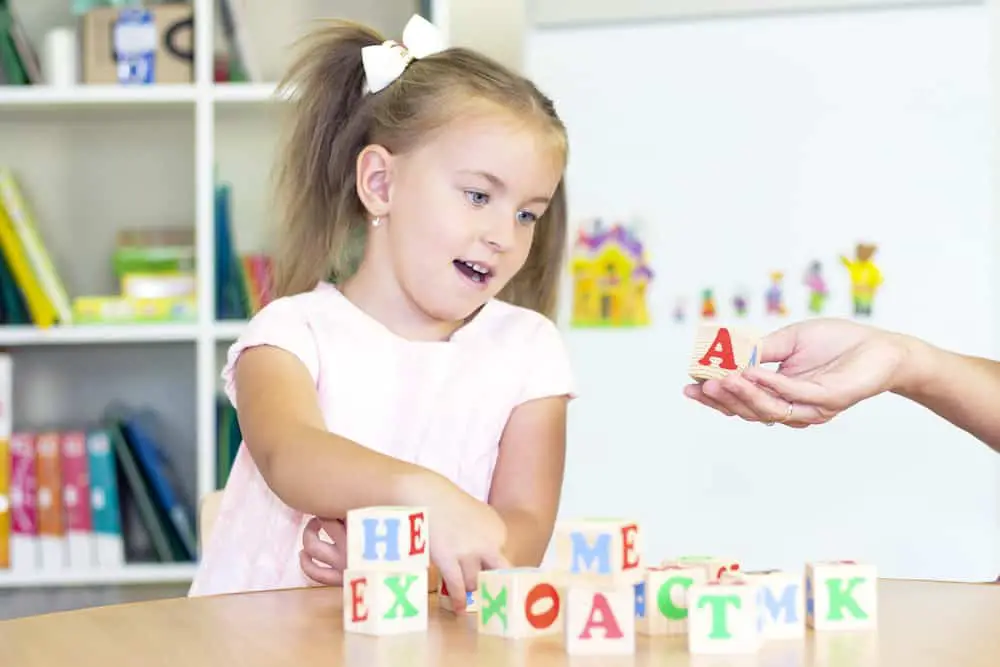Speech therapy games are a great way to help expand your child’s vocabulary and language skills.
Your child may not be thrilled at the idea of mom or dad giving them even more homework.
So we’ll sneakily hide their extracurricular learning within games.
The best games for speech therapy will be those that keep them amused and enthused the longest.
Keep reading to find the best speech therapy games to play with your child and variations on each game to help you target more specific needs.
Speech Therapy Games
There are many well-known games that you probably played as a child that make really great speech language games.
They allow your child to learn and practice language and social skills in a natural and relaxed setting.
Skills like turn-taking, eye contact, paying attention, and following directions, not to mention basic concepts and vocabulary.
Five of the Best Speech Therapy Games
Every speech and language game listed below will somehow help develop your child’s language skills.
You will probably recognize the first three, but the others may be new to you.
We’ve briefly explained how to play each one, in case you’re not familiar with it.
We’ve also highlighted the specific language skills that each game helps to strengthen.
Finally, we’ve suggested some variations to the game, enabling you to tweak the game to best suit your child’s needs.
Game #1: I Spy
You play “I Spy” by selecting an object in plain sight and then revealing the letter that it starts with.
You do this by saying, “I spy, with my little eye, something that begins with C.”
The other person then tries to guess what the object is.
Target Language Skills:
- Receptive language (Listening skills)
- Expressive language (Oral skills)
- Deductive reasoning
Variations That Focus On:
- Vocabulary
Instead of choosing items you can see, choose items from your child’s reading list or a book that you have open in front of you both.
- Phonics
Instead of saying “Begins with C”, you can say “Begins with the C (phonic) sound.”
- Categories
You can also change this game to suit a particular category you want to work on.
If your child needs help with shapes or colors, you can say, “I spy, with my little eye, something that is square” or “something blue.”
- Receptive Language
Rather than just taking turns, have your child play the “spying” role more often.
- Expressive Language
Ask your child to be the person guessing more often.
Related: Expressive Language Delay and How to Deal With It
Game #2: I Went Shopping…
You play “I Went Shopping…” by building up a long list of items you need to remember and recite.
Each player takes turns to add one item to the end of the shopping list.
If you add words alphabetically, it makes it easier for your child to play as they know what the next item begins with.
Plus, they’ll also be practicing their alphabet skills, and you can give them clues using the phonic sound.
Target Language Skills:
- Vocabulary
- Alphabet
- Phonics
- Memory
- Receptive language

Variations That Focus On:
- Vocabulary
Have your child add a new word to the list each time while you recite the list each time.
- Phonics
Instead of shopping, choose a destination that starts with the phonic you want to focus on.
Then all of the items that follow must also start with that same letter.
For example, “I went to Kentucky, and I brought kittens, kites, candy, cough drops…”.
- Categories
Instead of shopping, you could go to the zoo and name all of the animals you might see.
You could also play “In my schoolbag, I have…” or “In our house, we have…”
- Articulation
Focus on a sound that your child struggles with, for example, “I went to Rhode Island, and I took a rat, roller skates, rabbit…”
Related: Articulation for Speech Therapy
Game #3: Twenty Questions
Each player takes turns to pick an object, place, or person.
The other player has twenty “yes or no” questions they need to ask to try and work out what it is.
For example:
- Player One: “I’m thinking of something..”
- Player Two: “Is it a place?”
- Player One: “No.”
- Player Two: “Is it a person?”
- Player One: “Yes!”
Target Language Skills:
- Receptive language
- Expressive language
- Deductive reasoning
Variations That Focus On:
- Observation
Limit the subject matter to things that you can see in plain view.
- Logic and Deduction
Make a note of all the clues they’ve collected so far on a chalkboard or whiteboard.
- Conversation
Have your child answer in full sentences, instead of just “yes” or “no”.
For example, “No, it isn’t a person.”
- Expressive Language
Play the same game but instead of using “yes or no” questions, play with open questions.
Game #4: Sound Box
Find an old shoebox or something similar at home and label it with the sound you want to practice.
For example, you could start by making the box an “SH” box.
Next, wander around your house and garden, collecting all of the things you see that begin with the “SH” sound.
You might find a toy sheep, a ship, some shells, a small bottle of shampoo, a pair of shorts, a flashcard with a shark on it, and a shoe.
You could also make a “SH” and “TR” box to help broaden the number of items you can find. Add toy trucks, trumpets, and trains.
Ask your child to sound out the word of each object they find.
Later, they could even present their box to someone else in the house to further practice and recognize their good work.
Target Language Skills:
- Vocabulary
- Digraphs (When two letters come together to make one sound)
- Articulation
Variations That Focus On:
- Further Practice
To encourage further practice with these same objects, transfer them all to a bag before you put them away.
Then ask your child to stick their hand in the bag, feel each object and guess what it is before pulling it out.
- Phonics
If this game is too advanced for your child, you can also play this game with single alphabet letters.
- Expressive Language
Encourage your child to talk about each object they find by asking them to tell you everything they know about it.
Game #5: Alphabet Cards
If you own a set of alphabet cards, then you already have so many speech language games at your fingertips!
Hide some alphabet letter cards around the room and tell your child that they must find them as quickly as they can.
Kids just love being timed, and it can add excitement to some of the most mundane activities.
However, every time they find a new letter card, they must name three words beginning with that letter before hunting for the next one.
Keep a note of their “best time” score somewhere in the house where everyone can see it, like on the fridge.
Motivate them to beat their score every day.
You can hide the same letters over and over to help them practice words beginning with these letters.
Once they can readily name words for all of these letters, you can swap them out for another group of letters.
Target Language Skills:
- Vocabulary
- Articulation
- Alphabet
- Phonics
Variations That Focus On:
- Vocabulary
Instead of hiding letter cards, you could hide picture cards to help teach your child new words.
When they find a picture, they must say the word before hunting for the next card.
- Receptive Language
Hide the cards in harder spots and then give them clues to the locations.
- Expressive Language
When your child finds a card, ask them to describe where they found it.
Speech Therapy Board Games
If your child enjoys playing board games, why not incorporate speech therapy into the board games you play?
Take literally any board game in the world and simply vocalize the gameplay.
You can ask where the dice is and talk about which number you want to roll.
If appropriate for your child’s skill level, ask them questions about what they’re doing or going to do next.
Or you can work in some speech therapy practice sounds between each player’s turn.
Best Games for Speech Therapy
Ultimately, if your child is having fun while they’re learning, they’re more likely to try harder and learn faster.
If you have a busy day ahead of you, why not choose a speech and language game to play on the move?
You can play the first three games on our list anytime, anywhere.
You can play while you’re in the car, out shopping together, or even waiting for an appointment.
There are also lots of toys even for toddlers with autism that you can buy to help encourage your child to talk more.
Hopefully, the games featured here have given you lots of free ideas to get you started!

